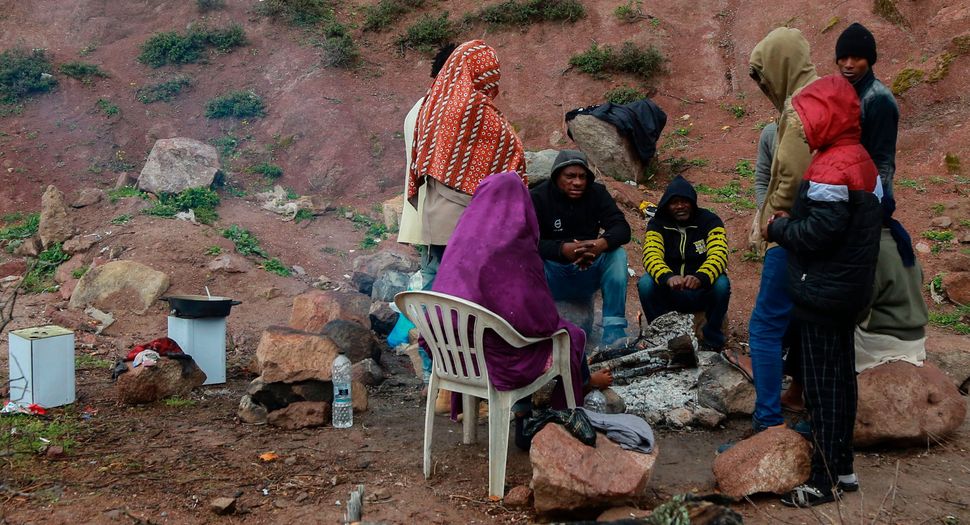We must recommit to helping refugees. We all come from Egypt.

Migrants from sub-Saharan African countries who arrived on the island of Lesbos five days ago, remain in quarantine in an open space designated by the Greek authorities, on the island of Lesbos, as Greece tries to control the spread of the novel coronavirus, COVID-19 on April 5, 2020. (Photo by MANOLIS LAGOUTARIS / AFP) (Photo by MANOLIS LAGOUTARIS/AFP via Getty Images) Image by Getty Images
As we face enormous uncertainties in dealing with COVID-19, we turn to our values to ground us. We confront the thin line between health and illness and we are inextricably connected in our collective desire for safety and health. We share the fragility of existence with an unbowed desire to connect with those suffering from an illness of uncharted gravity.
This week, Jews across the globe are celebrating Passover, which demands that we connect with our collective experience of the exodus from Egypt, not merely as a passively recounted artifact, but rather as a reminder that we were once strangers in the land of Egypt.
Rabbi Jonathan Sacks has noted that narrative is identity, and there is no more defining narrative of the Jewish people than our recurrent encounters with displacement, flight, migration, and resettlement. We enter as strangers and move forward as an expression of our common humanity with those who preceded us.
We come individually from places far and wide having unique stories of hope and despair that occur in places from which we escaped and places in which we resettled. But we all came from Egypt where we were slaves who journeyed through the winding ways of Exodus to a promised land of the body and the spirit.
No matter how distant the memory, we can never run away. We are from places that have embraced and bruised and shaped us. We know what it means to find haven one moment and experience subjugation the next: the Holy Temple. The Golden Age. Exile. The Crusades. The Inquisition. The Enlightenment. Pogroms. The Holocaust. Rebirth.
As a public service during this pandemic, the Forward is providing free, unlimited access to all coronavirus articles. If you’d like to support our independent Jewish journalism, click here.
To embrace our shared experience in Egypt is to open ourselves to the possibility of seeing in another human beings’ struggles a glimpse of our own — not because we compare historical periods, but because we touch another person’s distinct vulnerability and in so doing, we locate our shared humanity.
It is knowing the humility of having been enslaved and the courage to break free by crossing the sea that makes the tightrope of history balanced enough for us to walk.
Having been strangers in Egypt who then crossed the sea gives us a ticket to savor the sweetness of freedom that is tinged with the bitterness of suffering and the threat of displacement. We feel the steep price of admission into a land of freedom in a world pockmarked with cruelty, depredations, and persecutions.
For we all come from Egypt.
It is a cornerstone in many religious traditions to love thy neighbor. But the Torah on 36 occasions — more than any other prescriptive command — calls on us not simply to love our neighbors, but to welcome and honor the stranger, not only because we were all strangers in Egypt, but as a reaffirmation that the Divine in the magnificence of creation does not create a hierarchy in human worth. We must not invent new Pharaohs where none exist and hoist bricks on the backs of those who, like us, seek freedom.
We are witnessing an unprecedented surge in the number of the world’s refugees in conjunction with a retreat within the global community from providing protection to vulnerable populations. At present, there are nearly 71 million individuals — the largest figure in recorded history — who have been displaced and their prospects to achieve durable solutions have grown progressively more challenging.
The global refugee crisis in its dimensions and complexity appears to be intractable, but it resonates very deeply in the teachings of the Pirkei Avot, the teachings from Jewish ethical sources: “You are not obligated to complete the work, but neither are you free to desist from it.”
The stories of refugees seeking assistance are varied and troubling, but there is one single objective to their struggles: to live in safety and dignity. Those are the values to which we return at Passover as we face this global pandemic, locating our feet in the shifting sands of this moment. Collectively we help, for we all come from Egypt.
Robert Aronson is a practicing immigration attorney at Fredrikson & Byron in Minneapolis and concurrently serves as Chair of HIAS, the global Jewish nonprofit agency that protects refugees whose lives are in danger for being who they are. HIAS works globally in the name of the Jewish people to provide protection and safety to forcibly displaced persons, maintaining 79 offices worldwide in 15 countries located on five continents to provide life-saving services annually to roughly 750,000 forcibly displaced persons.
Rabbi Aaron Weininger is a Rabbi at Adath Jeshurun Congregation in Minnetonka, Minnesota and Co-Chair of the Minnesota Rabbinical Association.




















